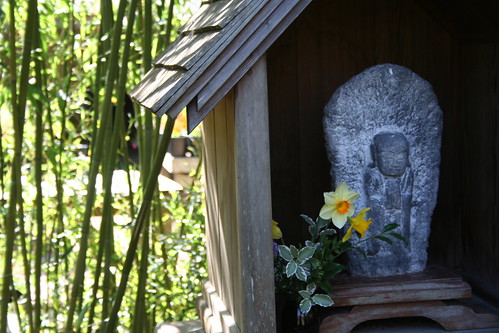*'Gone, gone, completely gone' -- part of the chant that accompanies the mizuko jizo ceremony.
Yesterday we went out the the Green Gulch Zen Center in Marin County for an afternoon mizuko jizo ceremony. This is a Buddhist tradition of remembrance for children who have either not made it into life or who have died shortly after being born. We went to put a 'close' on our own experience with the miscarriage in December.
It was a very quiet experience. It took place part in a yurt and part outdoors in a lovely garden. In the yurt there were altars with statues of deities from numerous religious and spiritual traditions whose purpose is to watch over children. In the yurt, two female priests dressed in flowing black robes led us through a period of quiet contemplation during which each participant created an offering to leave for Jizo, the buddhist deity in charge of lost children. They provided red cloth, rosemary (the herb of remembrance), fresh wildflowers, needles and thread, and other supplies that we used to make our offerings. We made offerings to Jizo and prayer sticks, that would later be hung in a tree for the wind to carry away.
I spent much of the quiet/creation time feeling somewhat disconnected to what I was trying to accomplish, but when it came time to leave our offerings, and the lovely priests led us in the chant that I quoted above, I finally felt a sense of release that I think I had been hoping to feel for months. The words 'gata gata paragata' -- 'gone, gone, completely gone' hit me deeply and I remembered looking at the ultrasound and just blurting out 'it's gone!' and the sadness that followed that knowing. But in feeling these words again, a sense of realization washed over me that this experience really had been completely beyond my control, and with that release came one last explosion of grief and then, as the priests led us all in a procession down to the jizo garden, a calm sense of peace, acceptance, and opening filled me.
We walked to the jizo garden, which was tucked away behind a stand of bamboo, nestled in among the zen center's rows of lettuce, beets, fruit trees, and other crops. As we walked, the priest at the front of the procession rang a singing bowl, and the other rang an enormous bell that was hanging from a tree that we passed by. We ended in the garden where we all left a second offering in a large tree that was strewn with past offerings, all slowly being scattered into the wind. The sun was at a perfect bright angle, and everything around us was blue and vibrant green, and we were remembering these losses in a place that was simply abundant with life, regeneration, and renewal. The earth at our feet was exploding in food.
The most poignant moment of all this for me was when we, as a procession, crossed a small bridge that covered a fast flowing stream, racing to the ocean. The sun was glittering on the surface of the water, making it silver. The crossing struck me deeply because of the buddhist tradition that we flow in and out of an ocean of life, for many years the ocean deposits us, wave by wave, and then for many years, it slowly sweeps us back. While I'm not a religious person, I really like this idea, and I was glad that the water figured into our experience.
I am so grateful that we went to this ceremony. Neither of us think very much of the miscarriage anymore, but clearly a closure of sorts was still useful for us both. I was so sad to see so many people there -- there were lots of heartbroken people with us in that yurt, and we couldn't help but wonder on the way home how many of them were there for losses like ours, and how many had actually lost a flesh and blood child? I can't imagine the pain, and I don't want to. But I do hope that those families have found some peace.
Monday, March 9, 2009
Gata gata paragata*
Subscribe to:
Post Comments (Atom)

1 comment:
It sounds like a heartbreaking, yet beautiful way to make peace with a terrible loss. Your description of this was so moving. :-)
Post a Comment